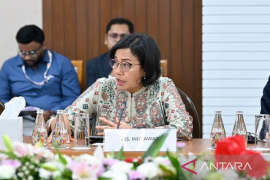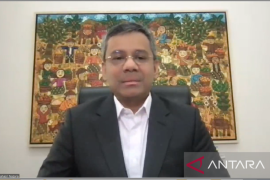At the end of 2022, the Indonesia Stock Exchange (IDX) Composite (IHSG/CSPI) reached a level of 6,850.26, an increase of 4.09 percent compared to the beginning of 2022 (year-to-date/ytd).
IHSG even set a new record last year by breaching a level of 7,318.02 on September 13.
Meanwhile, Indonesia’s market capitalization was recorded at Rp9,529.86 trillion at the year-end and reached an all-time high of Rp9,600 trillion (around US$629.3 billion) on December 27, 2022.
By the end of last year, 59 companies had conducted an initial public offering (IPO) and listed their shares on the IDX, taking the total number of companies listed on the IDX to 825.
The total funds raised from IPO shares reached Rp33.06 trillion last year—the highest level since IDX’s privatization in 1992.
Meanwhile, the number of investors in the Indonesian capital market increased by 37.5 percent year-on-year (yoy) to 10.3 million. Compared to 2017, the number showed an almost ninefold increase.
The Director of Corporate Assessment at IDX, I Gede Nyoman Yetna, said that the high number of listed companies and the rapid growth of retail investors were thanks to the government's consistency in maintaining the trend of economic growth over the past two years amid post-pandemic recovery efforts.
Head of the Finance Ministry’s Financial Sector Policy Center, Adi Budiarso, said that Indonesia recorded one of the most resilient economic performances in 2022.
The Indonesian economy managed to grow 5.31 percent yoy in 2022 from 3.69 percent yoy in 2021. This achievement met the government's target of 5.3 percent.
With the improving economic conditions post-pandemic, the 2023 state budget (APBN) has returned to the path of fiscal discipline by capping the budget deficit at 3 percent of the gross domestic product (GDP).
Budiarso said the government is committed to increasing economic productivity, which can help maintain the economic recovery momentum, considering that the fear of recession is still looming large this year.
He said that the efforts to mitigate risks are carried out by controlling deficit and debt, as well as supporting fiscal reforms.
According to Coordinating Minister for Economic Affairs Airlangga Hartarto, over the past year, the state budget has acted as a shock absorber that has helped control inflation and maintain purchasing power.
"This can be seen in Indonesia's economic growth rate, which ranked second in the G20 countries, below Saudi Arabia," Hartarto highlighted.
P2SK Law
This year, the capital market is expected to continue its growth trajectory with the sustained and robust national economic recovery. Moreover, the government has issued the Financial Sector Development and Strengthening (P2SK) Law.
Luthfy Zain Fuady, Director of Capital Market Regulation at the Financial Services Authority (OJK), emphasized the importance of implementing the P2SK Law as the regulatory outlook for the capital market in 2023.
"We realize that the details in the P2SK Law require coordination between ministries and institutions, for example, in the implementation of carbon trading, the development of financial derivative products, and the management of technological innovations in the financial sector," Fuady explained.
The P2SK Law covers consumer protection, with the Security Investor Protection Fund (SIPF) expected to ensure the safety of transactions in the capital market.
OJK is also seeking to cooperate with law enforcement institutions to crack down on financial crimes.
Nevertheless, the growth of the capital market sector needs to be supported by the trust of its users, Chairperson of the Indonesian Fintech Association (AFTECH), Pandu Sjahrir, said.
"Industry players need to increase public trust to prevent a false sense of confidence," Sjahrir added.
Financial crimes have a long-term impact on public perception, for instance, they can trigger insecurity or even antipathy against certain financial products and capital markets.
Therefore, Sjahrir said, regulators need to have the capacity to tackle finance-related crimes, and one of the tools to do that is the P2SK Law.
He deemed the P2SK Law comprehensive enough to regulate the high dynamics of the financial sector, such as in the capital market.
Deputy Minister of Finance, Suahasil Nazara, informed that there are five pillars of focus of the P2SK Law.
The first is strengthening financial service institutions; second, increasing the trust of investors, consumers, and financial service users; and third, promoting long-term fund accumulation.
The fourth pillar is state protection for financial product consumers, and lastly, digital financial sector literacy and inclusion.
Measures to protect consumers have included the opening of the long-awaited insurance policy guarantee program as a mandate of the Insurance Law enacted in 2014.
Through the P2SK Law, financial institutions such as Bank Indonesia (BI), OJK, and the Deposit Insurance Corporation (IDIC/LPS) will also be strengthened by additional functions and mandates.
Related news: OJK highlights steps to push capital market industry in 2023
Related news: Early age education of capital market improves public knowledge: OJK
Related news: Positive stock market performance in 2022 capital for 2023: minister
Translator: Agatha V, Kenzu T
Editor: Anton Santoso
Copyright © ANTARA 2023












